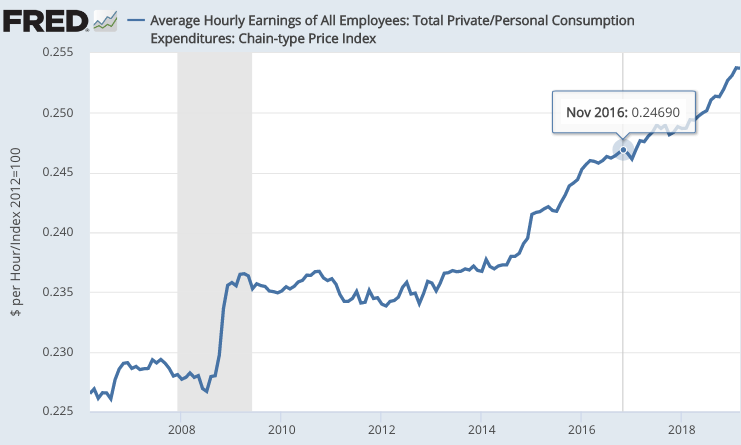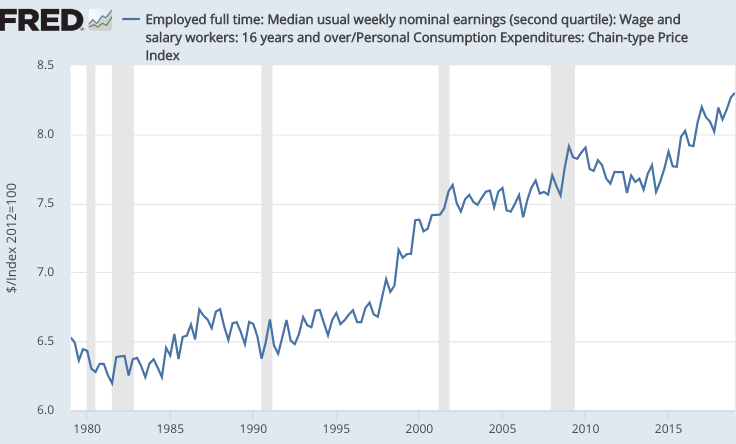
After the 2016 election, several pundits suggested that the Trump victory reflected frustration with stagnant real wages. Unfortunately, this argument is based on a misconception.
The average hourly earnings series at the FRED data site only goes back 12 years, but real wages were doing well before the 2016 election:
 BTW, in nominal terms, average hourly earnings are currently $27.77/hour.
BTW, in nominal terms, average hourly earnings are currently $27.77/hour.
FRED does have a much longer series for average wages earned by production and nonsupervisory employees (which currently stands at $23.31):
 I could not find median hourly wages, but they did have data on median weekly wages (currently $905):
I could not find median hourly wages, but they did have data on median weekly wages (currently $905):
 There was a period of stagnant real wages, but it ended in the mid-1990s. All of these series show significant growth in real wages since the mid-1990s. Whatever explains the rise of populism in America, it is not stagnant wages.
There was a period of stagnant real wages, but it ended in the mid-1990s. All of these series show significant growth in real wages since the mid-1990s. Whatever explains the rise of populism in America, it is not stagnant wages.
BTW, these time series understate the growth in total labor compensation, as the cost of fringe benefits such as health care has risen faster than nominal wage growth. Alternatively, if you believe that health benefits are nearly worthless (my view), then the nominal wage series should be deflated by a price index that excludes health care. That would show even more rapid growth in real wages.
PS. There is one downside to writing a post and then delaying the publication. Today’s Bloomberg has an article that makes many of the same points, and in some cases more effectively. But it doesn’t have my graphs.

READER COMMENTS
Michael Rulle
May 15 2019 at 12:48pm
I have read many articles on this same point, but yours (combined with Bloomberg) is by far the most clear. How bizarre the info is hiding in plain site on FRED. Paul Krugman in several articles at least, has promoted stagnation. I assume he and others have same info. Do economists lie for political reasons? Don’t know. Andy Kessler (with no evidence, just Heuristics) promoted the notion in WSJ we actually have deflation. Don’t know how one tests his idea, but that is interesting.
Ken P
May 15 2019 at 1:58pm
The media has been saying wages are stagnant for over a decade. Most people I know believe that to be true. The unfortunate part is not that they are wrong (I’m glad wages have not been stagnant) but that such false narratives can get so much traction.
There may be something else going on here too. For many people in declining rural communities wages ARE stagnant. So the lie told by the left resonates most with populists on the right.
Brandon Berg
May 15 2019 at 2:45pm
It’s worth pointing out here that most of the claims about wage stagnation are based on a) looking only at men’s wages, since women’s wages have seen much stronger growth, and b) using the CPI deflator rather than PCE.
artifex
May 15 2019 at 3:14pm
Perceptions of wage stagnation are unrelated to actual wage stagnation, and only the perceptions have influence on politics. Therefore, even if wages were stagnant, that could not explain populism.
Seriously, if economists looking at time series can’t agree about whether there is wage stagnation, you think most workers are going to have any clue? For explaining populism (or anything in politics), a theory of people’s economic perceptions will be a lot more useful than a theory of actual economics.
Gordon
May 15 2019 at 5:24pm
Scott, recreating your second graph but using the average hourly earnings of production and non-supervisory employees in manufacturing shows very little real wage growth between 2010 and November of 2016. So while the explanation probably doesn’t apply to voters in general, it may apply to just enough voters to have made a difference in swing states.
Scott Sumner
May 16 2019 at 8:16pm
Perhaps, but real wage growth during 2016 was quite strong.
Lorenzo from Oz
May 15 2019 at 7:43pm
Very clear data: an explanation for the pattern would be even better.
I suspect cultural politics may be more at play than economic factors in 2016. Or in 2018 come to that.
Mark
May 15 2019 at 9:13pm
Perhaps people care more about nominal wages than real wages because everyone knows exactly what raise they got, but only has a general idea of what inflation is? I frequently see people using nominal values when talking about wage growth. I think this is odd, but it would explain why people thought wages were more stagnant in 2015; real wage growth was the same then, but it consisted of lower nominal wage growth and lower inflation.
Daniel R. Grayson
May 15 2019 at 10:08pm
Re: “health benefits are nearly worthless”
Why do you believe that?
robc
May 16 2019 at 9:22am
At the beginning of ACA, I was still single, and my policy went up in cost because it had to cover pregnancy.
While it all may not have been worthless, parts of it absolutely were.
Matthias Görgens
May 16 2019 at 11:54am
Additional spending on health care is not all that effective in giving additional quality adjusted life years.
Scott Sumner
May 16 2019 at 8:14pm
Perhaps I am relying too much on personal experience. I have not received any significant net value from these benefits, as the hassle of dealing with insurance companies has been greater than the medical care benefits received.
Phil H
May 16 2019 at 4:48am
Indeed, the Trump phenomenon was not driven by stagnant wages, nor by the perception of stagnant wages, because the Trump phenomenon did not exist. Approximately 50% of the electorate voted Republican in the 2016 presidential election, just as it has in every presidential election that I can remember.
“Populism” may exist in local US politics, I don’t know. But at the national level, so far as I can see, it is 100% Beltway hype.
Scott Sumner
May 16 2019 at 8:12pm
Good point.
Miguel Madeira
May 17 2019 at 7:13am
But, in the Republican primaries of 2016, much more people voted in Trump than in Buchanan in 1992 and 1996, Huckabee in 2008 or Santorum in 2012.
Phil H
May 19 2019 at 2:02am
That’s a good point, and I agree that it *could* be evidence for populism as a factor in Trump’s election. I don’t think it is, because I think there is a simpler explanation for Trump’s high share of the vote: Fame. My guess is that Republicans voted for Trump simply because he was a much, much bigger name than anyone else on the ballot.
I could be wrong; or you might argue that fame itself is a part of populism. But the Republican Party had a brush with populism quite recently, in the form of the Tea Party, and Trump doesn’t seem much like the Tea Party. So I’m not yet convinced that he represent populism, or any type of politics. What he represents to me is that the Republican Party is not functioning properly as a mechanism for placing competent candidates on ballots, and this dysfunction has been taken advantage of by a self-absorbed, rich man.
Frank Conte
May 18 2019 at 2:37pm
Professor Sumner:
Great post. I republished the post via the FEE site.
https://eastbostoneconomics.blogspot.com/2019/05/after-2016-election-several-pundits.html
Can you advise on how you generated the first graphic from FRED. I tried to replicate and was unable to do so. Are you adding a customized formula to the chart?
Are you factoring in private/personal consumption before generating the wages?
FC
Benjamin Cole
May 20 2019 at 8:00pm
“Hong Kong has some of the most expensive housing prices in the world. With highly-priced apartments that are incredibly cramped, it is no small wonder that they’re sometimes referred to as nano flats, capsule homes or micro apartments.
Such abodes may only be the spatial equivalent of a 134-square foot (12.4-square meter) parking space and can easily cost upwards of three million Hong Kong dollars (US$382,00). Yet despite the rooms resembling little more than cages, demand for them is at an all-time high.”
—30—
The cost of housing may explain the paradox of apparently higher real wages yet lower real living standards. It is difficult to measure the cost and “value” of housing in constructing price indices and real wage indices.
One could posit, for example, that modern Hong Kongers have even higher living standards than before, although living in a shoebox, because they live in a more glamorous city resulting in terrific demand for space in that city. Thus, due to city amenities, a shoebox is a better deal than larger quarters of two generations ago. To some extent this is how housing and wages are measured in the US.
Kevin Erdmann of the Mercatus Center has posited that property zoning and other building restrictions allow building owners to extract all income gains through economic rents.
Thus, in Erdmann’s view, higher real wages are just sucked away through economic rents.
So often, housing is something of a wrench thrown into the macroeconomic works.
Frank Lessa
May 23 2019 at 8:09am
I find the cost of housing a problematic economic metric because individuals within any market – let alone across markets – spend widely varying sums for housing, while receiving widely varying value for their respective expenditures.
e.g. I pay more to rent a room than many of my friends and neighbors pay to own houses.
Perhaps individuals enjoying the poorest value for their housing dollar (e.g. me) tend to have greater economic angst?
Frank Lessa
May 23 2019 at 8:19am
p.s.
Re: Erdman on property owners extracting income through economic rents.
Tyler Cowen has a recent piece in which he suggests this is precisely where many cities are headed, and uses the example of a minimum wage hike being captured by landowners.
https://www.bloomberg.com/opinion/articles/2019-03-26/if-you-can-t-afford-the-rent-it-s-my-problem-too
Benjamin Cole
May 20 2019 at 10:08pm
BTW there is a FRED chart for every season!
Employed full time: Median usual weekly real earnings: Wage and salary workers: 16 years and over (LES1252881600Q)
The above chart shows median wages flat to down going back to 1978 or so and then gaining slightly since 2015-6.
https://fred.stlouisfed.org/series/LES1252881600Q
So it appears real median—-i said “median”—wages have hardly budged in 40 years.
Comments are closed.